Foreign Minister of Pakistan H.E. MAKHDOOM SHAH MAHMOOD QURESHI Visited SIIS
Welcoming Remarks to His Excellency Foreign Minister Makhdoom Shah Mahmood Qureshi of the Islamic Republic of Pakistan at the Shanghai Institutes for International Studies
Jiemian YANG, President of SIIS
February 24, 2010
Your Excellency Foreign Minister Qureshi,
Distinguished Pakistani guests,
Ladies and Gentlemen:
Today, we are extremely honored and pleased to welcome Foreign Minister Qureshi to visit and deliver an important speech at the Shanghai Institutes for International Studies (SIIS). We are honored because Pakistan is our great neighbor and great friend, and your excellence’s visit will enhance the friendship between our two countries. We are pleased because your visit provides us with an enormous opportunity to learn your insightful views that will help our researches with better understanding at a very high level. Furthermore, I am particularly pleased that Your Excellency came on the occasion of our celebrating the 50th anniversary of the founding of SIIS, your coming and speech is not only adding a great dimension to our celebration, but also contributing to the better understanding between our two countries and beyond.
The SIIS was founded in 1960 with the initiative of late Premier Zhou Enlai, who played a decisive role at his time in the making of Chinese foreign policy including the pursuance of all-weather friendship with Pakistan. Following his instruction, the SIIS fully devotes to academic research on international relations and China’s foreign policy. Over the past half century, our research fellows have developed academic interests extensively, focusing on crucial areas and engaged in studies of countries, regions and transnational issues.
Ladies and Gentlemen:
China and Pakistan are two great nations. We have had long term and historic ties that can be traced back thousand years. It is the deeply rooted civilizations that bound us together and make it possible for the two peoples to learn from each other. Today, in modern times, our two countries have established solid and mutually beneficial relations that include all the aspects of a successful bilateral relationship. The relationship stands to all kinds of tests. Despite changes of the international situation, China and Pakistan remain working together for a better future by constantly enhancing our strategic and cooperative relations. A friendly and faithful relationship like what China and Pakistan have built up is very much typical to illustrate what good neighbors are all about. I believe that, China-Pakistan relationship that has been strengthened by successive leaderships of the two nations will continue to develop and it will have a more promising future.
As a think tank, we are policy oriented and strategically focused. We are fully aware of the importance of Pakistan in South Asia and in the world at large. With rapid changes in the region, Pakistan has been increasingly in a position that will decide the future of some crucial issues such as development of Afghanistan and prospect of US-led campaign against terror. Meanwhile, we have observed the heavy burdens the Pakistani people have to take in these conflicts. As a neighbor, China is concerned about what is going on in the region, and the Chinese people want to work with the Pakistani people for stability and peace. It is in this context that we would like to thank Your Excellency for giving us a great opportunity to hear your views. I believe that your views, as that from one of the decision-makers in Islamabad, will educate us greatly.
Ladies and Gentlemen:
Foreign Minister Qureshi himself is a great friend to China. After his assumption of the current position, His Excellency Minister Qureshi has repeatedly emphasized that Pakistan has the most comprehensive economic, political and strategic relationship with China and greatly values this relationship. He visited China many times either on his own or accompanying Pakistani leaders.
As we are here outside of Beijing, I want to call your attention to the fact that Foreign Minister Qureshi came from a very prestigious family in Punjab where his father served as its Governor. He himself completed his education in both Pakistan and United Kingdom. In addition to his various posts in Pakistani government both in Islamabad and Punjab, he is also president of Pakistan People’s Party in Punjab. We are sure his contribution to this end is of great importance and significance.
Ladies and Gentlemen:
Address of
H.E. MAKHDOOM SHAH MAHMOOD QURESHI
FOREIGN MINISTER OF PAKISTAN
AT
SHANGHAI INSTITUTES FOR INTERNATIONAL STUDIES
(SHANGHAI, 24 February 2010)
Honorable President,
Distinguished Scholars,
Ladies and Gentlemen,
I consider it a special privilege to speak at the prestigious Shanghai institutes for international studies(SIIS). This institute has come to signify the intellectual vigour of the great Chinese nation. Through its extensive web of institutes and centers of learning, the SIIS encapsulates the rich thought and intellectual traditions of a civilization that spans 5 millenniums. This is indeed a heritage in which you, as scholars, can take justifiable pride.
Let me also say a few words about the breathtaking development, I have witnessed in this great vibrant city of Shanghai, since we landed here yesterday. I pay tribute to the leadership of the city, and indeed the leadership of China, for the most impressive transformation and economic development accomplished in the last two decades. Your economic and political strength augurs well for the future of the world.
This year Shanghai will also be hosting a landmark event, the Shanghai Expo 2010. We in Pakistan wish you every success in what we know will be a spectacular event; and assure you of our full and enthusiastic participation.
Ladies and Gentlemen,
Leaders, diplomats, analysts, media-persons and people alike call Pakistan-China relationship all-weather and time-tested – a relationship higher than the Himalayas and deeper than the oceans. It has also been called a model relationship. The two countries have enjoyed all round cooperation. President Hu Jintao has called Pakistan and China good neighbors, close friends, dear brothers, and trusted partners. President Asif Ali Zardari said that Pakistan-China friendship is rooted in the hearts and minds of the people of the two countries.
The foundations for this relationship were laid by charismatic leaders-Chairman Mao Zedong, Premier Zhou Enlai, and Prime Minister Zulfiqar Ali Bhutto.
Pakistan and China are strategic partners. But this partnership is not the result of an accident or expediency. This unique relationship stems for history, geography, and contemporary realities.
Pakistan and China are joined by mountains and rivers. But they are also joined by civilizational cross currents, going back thousands of years. Fa Shien and Shuan Zang broke the physical barriers between our lands in the 5th and 7th centuries, by crossing mountains and bringing back understanding of Buddhist scriptures and civilization.
Since the establishment of diplomatic relations, Pakistan-China relationship has been on an upward curve. In this unique relationship, there have been frequent “highs”, but no “lows”; lots of “peaks”, but no “troughs”.
In the past thirty years, China has pursued a distinctive paradigm, combining command and market economies. Today, China has the third largest economy in the world in terms of GDP. In the strategic sphere, China has now established itself as a major global player. The new world order cannot be conceived without China. And China’s soft power extends to Asia, and beyond to the entire globe.
Ladies and Gentlemen,
Even with these dramatic internal changes in China, Beijing has maintained and strengthened its ties with Pakistan. This relationship is based not on asymmetry, but a unique equilibrium between two states with varying strengths. The unique relationship between Pakistan and China is based on two core principles: mutual respect and mutual benefit.
Pakistan-China relationship has three constituents: strategic partnership; economic cooperation, and people to people contacts. In this calculus, the security dimension has been the strongest; but now the two sides are making conscious efforts to underpin this relationship with strengthened economic cooperation, and deepened cultural interaction at the level of the people.
Both countries have consultative mechanisms on counter-terrorism, arms control and disarmament, strategic dialogue, and defense and security matters. We need to use them more effectively.
Both countries have vowed to eliminate the common threats of terrorism, extremism and separatism. In the area of countering terrorism, cooperation has been productive. We need to step up our cooperation in this area to dismantle terrorist apparatus, threatening our safety and security.
Our defense and security cooperation is the backbone of the strategic partnership. It is a relationship, not driven by purely commercial or military needs. It provides us with precious opportunities to develop our sinews to face threats and challenges, through joint exercises and training. In peacetime, and in time of crises, we have always valued China’s defense assistance; characterized by reliability, quality and continuity. This assistance has also been free of political conditionalities.
In the international forums, we will continue to support each other. We fully endorse One China Policy and consider Taiwan to be an inseparable part of China. Similarly, we support China’s stance on Tibet, Xinjiang and the so called human right related issues. China has helped Pakistan in the Security Council. Our delegations in New York have been working closely on the issues of UN reform and restructuring.
Pakistan and China have been working on the concepts of energy and transportation corridors, that would enable China to access multiple regions and make Pakistan a regional economic hub. We look forward to Pakistan acting as China’s strategic artery for communication with West Asia, South Asia, and the Persian Gulf. Gwadar Port and the Karakorum Highway, supported by other transportation arteries, are the building blocks of such a strategy.
We have successfully collaborated in the peaceful uses of unclear energy. Two projects - C1 and C2 – have been completed under IAEA safeguards. These projects have helped us reduce our energy deficit.
We have seen some impressive strides in our trade and economic relations. Our two way trade, which used to be less than $ 2 billion in 2002, is now around $ 7 billion. We have established a Five Year Programme for trade and economic cooperation, for the period 2006 to 2011. A Pakistan-China Joint Investment Company (JIC) has been established. This company, over time, will act as a conduit for grater Chinese investment in Pakistan.
This kind of momentum was generated following the consensus between the two countries that the extent of our economic cooperation did not match our unique political relations.
Chinese investments in Pakistan have been going into, among others, telecommunications, energy, infrastructure, heavy engineering, IT and mining. Today, we have 120 Chinese enterprises and 11,000 Chinese working in Pakistan; in such sectors as infrastructure development, power generation and telecommunications.
Pakistan and China have immense reservoir of goodwill at the popular level. The legendary friendship between Pakistan and China is palpable in the Pakistan and Chinese street, and in the majestic halls of government. Usually Pakistani and Chinese leaders and people use six expressions to describe this unique relationship. It is higher than the mountains, deeper than the oceans, sweeter than honey, stronger than steel, all-weather and time-tested.
The friendship between Pakistan and China will gain in strength in the future. Apart from mutual benefit, what binds us together is our shared idealism for a safe, secure and prosperous neighbourhood; free from strife, embracing peace, harmony and understanding. Looking at the situation in our region today, this may sound like a distant dream; but we believe that it is within our power to achieve this goal.
Ladies and Gentlemen,
It is part of broader global threat of the world sliding into a medieval mindset. The rising tides of extremism, terrorism, sectarian conflicts and violence pose a grave threat to human civilization.
While the tragic events of 9/11 seven years ago brought this problem into sharper focus, it is important to remember that our struggle against terrorism predates 9/11. We decided to respond to this challenge firmly and strike militancy at its roots. Our counter-terrorism strategy is based on three Ds: Development, Dialogue and Deterrence.
We have vowed not to let militants impose their political agenda on the people. We would not let them distort the message of Islam. The entire population of Pakistan has demonstrated the ownership of war against terrorism; as their communities are hit randomly and ferociously by terrorists every day.
We are acutely conscious that terrorism cannot be fought by military means alone. It requires political will, mobilization of the grass-root communities, and a result-oriented socio-economic development strategy. People in the tribal areas, in NWFP and Balochistan need roads, bridges, jobs, water, school, and clinics. Poverty there must eradicated. We have set aside more than Rs.130 billion for FATA Sustainable Development Plan. This is in addition to the funds committed by the US for the establishment of the reconstruction opportunity zones (ROZs).we also allocated Rs.1 billion for quick impact welfare and development projects.
Apart from the specific focus on FATA, the economy of Pakistan on the whole must perform better; despite the uncertainties created by the security situation. The fundamentals of our economy are sound, despite heavy battering it received from the international financial crisis. Our major crops have been good. Small and medium sized enterprises have been doing well; and we are trying to revive the large manufacturing sector. Remittances from abroad have doubled to more than US $ 7 billing. Our growth rate is projected to climb back to 4 per cent per annum in the fiscal year 2010-2011. Our investment regime is most liberal and hospitable.
We want the international community to help us with our effort to accelerate social and economic development in Pakistan. We are, however, not looking for dependence on foreign assistance. To strengthen our industry, and to generate productive employment, we need removal of trade barriers against Pakistani exports and provision of economic incentives to businesses in Pakistan. That will be the most viable response to terrorism.
If the international community and our region do not move in concert on the political, military and economic tracks, terrorists and their twisted ideology would win. No country is immune from this cancer. It must be cauterized and treated for all times to come. It must not spread.
Extra-regional forces should fully respect sovereignty, independence and territorial integrity of Pakistan. In our territory, we are in charge. No force can do a better job than our armed forces.
Ladies and Gentlemen,
The democratic government in Pakistan has brought about a fundamental transformation in Pakistan’s relations with Afghanistan. We are engaging Afghanistan in a multi-track cooperation that has resulted in building further confidence between the two countries. We intend to further intensify the bilateral cooperation with Afghanistan in President Karzai’s second term. We have invited President Karzai to undertake a visit to Pakistan at his earliest convenience.
Pakistan supports afghan-led and Afghan-owned political process. We feel that President Karzai has rightly lunched an indigenous Afghan process of reconciliation and reintegration. We have consistently maintained that it is for the Afghan people to conceive, elaborate and drive this political process.
We believe that the troopers’ surge in Afghanistan should nor lead to a renewed influx of refugees and terrorists into Pakistan, especially into Balochistan. A fixed date for the withdrawal of US troops runs the risk of enabling the Taliban to bide the time, and intensify their recruitment.
Pakistan feels that the regional countries should not allow their territories to be used for activities detrimental to each other’s interests; should enhance regional connectivity through strengthening of energy, trade, and transport corridors; and should ensure that regional processes have the ownership of immediate neighbors of Afghanistan.
We believe that as a global power, China has a vital role to play in building confidence, in fostering conditions for peace, and in supporting development efforts. China’s presence and proactive stance will be a positive factor for all neighboring countries. For its part, Pakistan is grateful to China for not only understanding Pakistan’s perspective but for giving us practical assistance.
China fully understands that Pakistan is negotiating a difficult transition. We have made conscious choices to espouse democracy, to make economic development the central plank of our national policy, to eliminate terrorism, and to promote tolerance and respect for diversity.
Ladies and Gentlemen,
In this context, we appreciate China’s Consistent and unequivocal support to Pakistan’s efforts to uphold its sovereignty, independence and territorial integrity. We respect the countries that do not interfere in the internal affairs of other states.
As new developments unfold in and around Pakistan, we are vigilant; so that we remain focused on our core interests to foster development, to fight terrorism and to promote stability in the region.
Thank you!
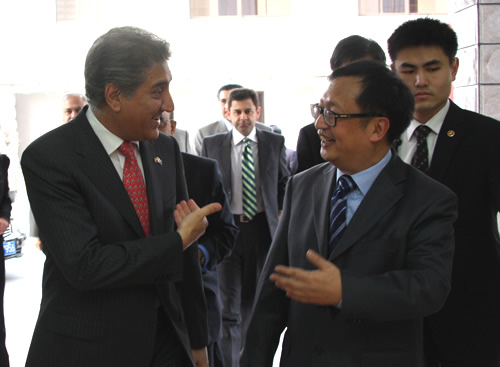
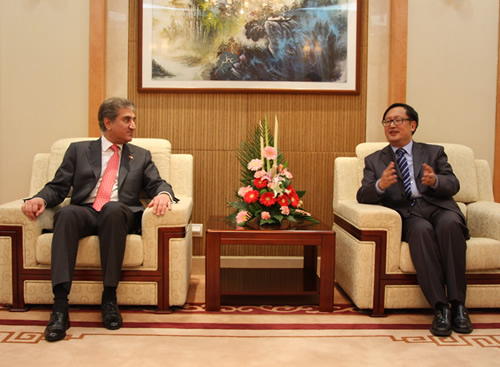
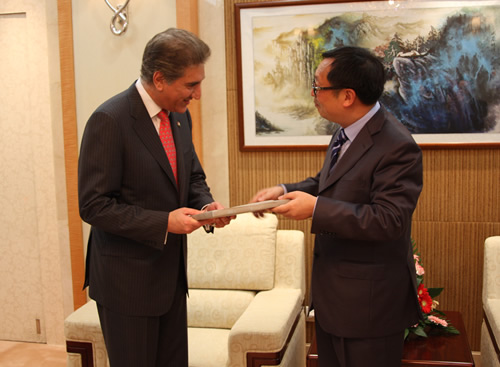
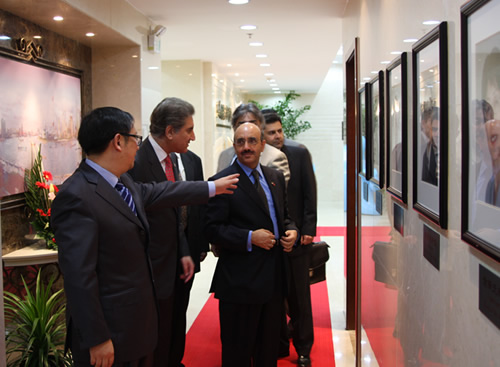
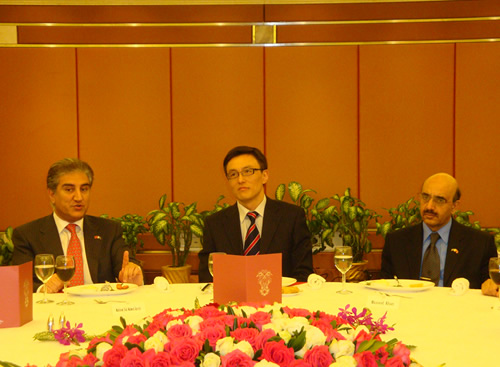
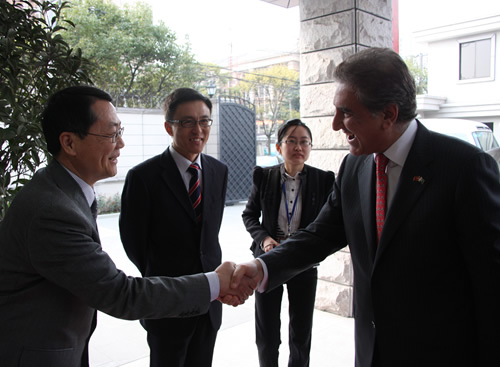
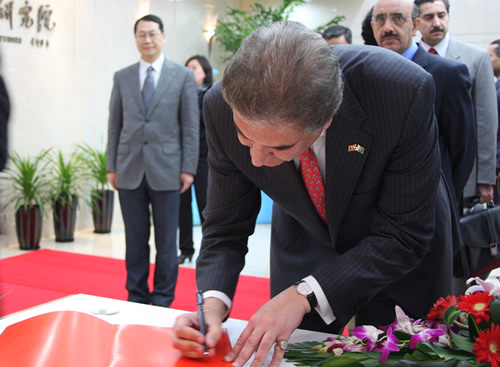
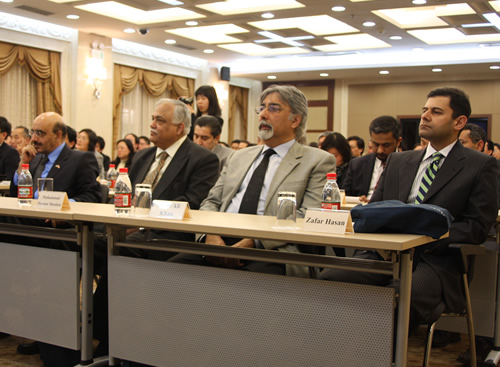
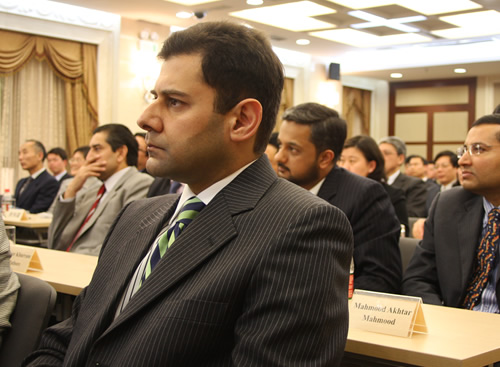
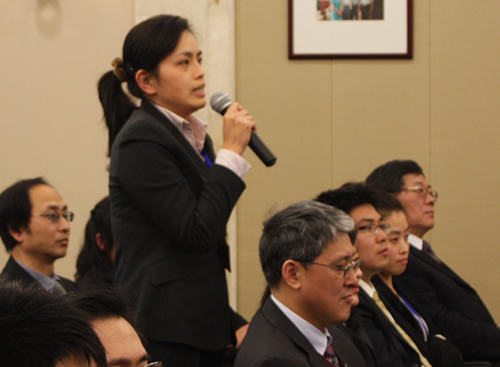
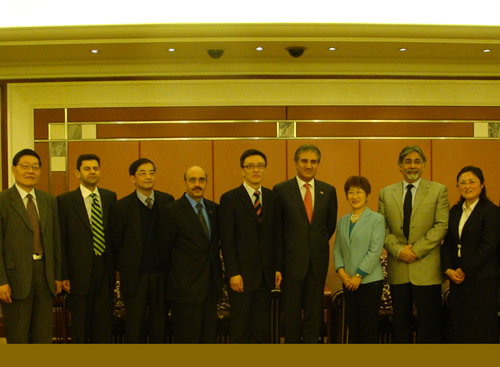

2016/09/10 read:732
Welcoming Remarks to His Excellency Foreign Minister Makhdoom Shah Mahmood Qureshi of the Islamic Republic of Pakistan at the Shanghai Institutes for International Studies
Jiemian YANG, President of SIIS
February 24, 2010
Your Excellency Foreign Minister Qureshi,
Distinguished Pakistani guests,
Ladies and Gentlemen:
Today, we are extremely honored and pleased to welcome Foreign Minister Qureshi to visit and deliver an important speech at the Shanghai Institutes for International Studies (SIIS). We are honored because Pakistan is our great neighbor and great friend, and your excellence’s visit will enhance the friendship between our two countries. We are pleased because your visit provides us with an enormous opportunity to learn your insightful views that will help our researches with better understanding at a very high level. Furthermore, I am particularly pleased that Your Excellency came on the occasion of our celebrating the 50th anniversary of the founding of SIIS, your coming and speech is not only adding a great dimension to our celebration, but also contributing to the better understanding between our two countries and beyond.
The SIIS was founded in 1960 with the initiative of late Premier Zhou Enlai, who played a decisive role at his time in the making of Chinese foreign policy including the pursuance of all-weather friendship with Pakistan. Following his instruction, the SIIS fully devotes to academic research on international relations and China’s foreign policy. Over the past half century, our research fellows have developed academic interests extensively, focusing on crucial areas and engaged in studies of countries, regions and transnational issues.
Ladies and Gentlemen:
China and Pakistan are two great nations. We have had long term and historic ties that can be traced back thousand years. It is the deeply rooted civilizations that bound us together and make it possible for the two peoples to learn from each other. Today, in modern times, our two countries have established solid and mutually beneficial relations that include all the aspects of a successful bilateral relationship. The relationship stands to all kinds of tests. Despite changes of the international situation, China and Pakistan remain working together for a better future by constantly enhancing our strategic and cooperative relations. A friendly and faithful relationship like what China and Pakistan have built up is very much typical to illustrate what good neighbors are all about. I believe that, China-Pakistan relationship that has been strengthened by successive leaderships of the two nations will continue to develop and it will have a more promising future.
As a think tank, we are policy oriented and strategically focused. We are fully aware of the importance of Pakistan in South Asia and in the world at large. With rapid changes in the region, Pakistan has been increasingly in a position that will decide the future of some crucial issues such as development of Afghanistan and prospect of US-led campaign against terror. Meanwhile, we have observed the heavy burdens the Pakistani people have to take in these conflicts. As a neighbor, China is concerned about what is going on in the region, and the Chinese people want to work with the Pakistani people for stability and peace. It is in this context that we would like to thank Your Excellency for giving us a great opportunity to hear your views. I believe that your views, as that from one of the decision-makers in Islamabad, will educate us greatly.
Ladies and Gentlemen:
Foreign Minister Qureshi himself is a great friend to China. After his assumption of the current position, His Excellency Minister Qureshi has repeatedly emphasized that Pakistan has the most comprehensive economic, political and strategic relationship with China and greatly values this relationship. He visited China many times either on his own or accompanying Pakistani leaders.
As we are here outside of Beijing, I want to call your attention to the fact that Foreign Minister Qureshi came from a very prestigious family in Punjab where his father served as its Governor. He himself completed his education in both Pakistan and United Kingdom. In addition to his various posts in Pakistani government both in Islamabad and Punjab, he is also president of Pakistan People’s Party in Punjab. We are sure his contribution to this end is of great importance and significance.
Ladies and Gentlemen:
Now let us warmly welcome His Excellency Minister Qureshi to deliver his speech.
Address of
H.E. MAKHDOOM SHAH MAHMOOD QURESHI
FOREIGN MINISTER OF PAKISTAN
AT
SHANGHAI INSTITUTES FOR INTERNATIONAL STUDIES
(SHANGHAI, 24 February 2010)
Honorable President,
Distinguished Scholars,
Ladies and Gentlemen,
I consider it a special privilege to speak at the prestigious Shanghai institutes for international studies(SIIS). This institute has come to signify the intellectual vigour of the great Chinese nation. Through its extensive web of institutes and centers of learning, the SIIS encapsulates the rich thought and intellectual traditions of a civilization that spans 5 millenniums. This is indeed a heritage in which you, as scholars, can take justifiable pride.
Let me also say a few words about the breathtaking development, I have witnessed in this great vibrant city of Shanghai, since we landed here yesterday. I pay tribute to the leadership of the city, and indeed the leadership of China, for the most impressive transformation and economic development accomplished in the last two decades. Your economic and political strength augurs well for the future of the world.
This year Shanghai will also be hosting a landmark event, the Shanghai Expo 2010. We in Pakistan wish you every success in what we know will be a spectacular event; and assure you of our full and enthusiastic participation.
Ladies and Gentlemen,
Leaders, diplomats, analysts, media-persons and people alike call Pakistan-China relationship all-weather and time-tested – a relationship higher than the Himalayas and deeper than the oceans. It has also been called a model relationship. The two countries have enjoyed all round cooperation. President Hu Jintao has called Pakistan and China good neighbors, close friends, dear brothers, and trusted partners. President Asif Ali Zardari said that Pakistan-China friendship is rooted in the hearts and minds of the people of the two countries.
The foundations for this relationship were laid by charismatic leaders-Chairman Mao Zedong, Premier Zhou Enlai, and Prime Minister Zulfiqar Ali Bhutto.
Pakistan and China are strategic partners. But this partnership is not the result of an accident or expediency. This unique relationship stems for history, geography, and contemporary realities.
Pakistan and China are joined by mountains and rivers. But they are also joined by civilizational cross currents, going back thousands of years. Fa Shien and Shuan Zang broke the physical barriers between our lands in the 5th and 7th centuries, by crossing mountains and bringing back understanding of Buddhist scriptures and civilization.
Since the establishment of diplomatic relations, Pakistan-China relationship has been on an upward curve. In this unique relationship, there have been frequent “highs”, but no “lows”; lots of “peaks”, but no “troughs”.
In the past thirty years, China has pursued a distinctive paradigm, combining command and market economies. Today, China has the third largest economy in the world in terms of GDP. In the strategic sphere, China has now established itself as a major global player. The new world order cannot be conceived without China. And China’s soft power extends to Asia, and beyond to the entire globe.
Ladies and Gentlemen,
Even with these dramatic internal changes in China, Beijing has maintained and strengthened its ties with Pakistan. This relationship is based not on asymmetry, but a unique equilibrium between two states with varying strengths. The unique relationship between Pakistan and China is based on two core principles: mutual respect and mutual benefit.
Pakistan-China relationship has three constituents: strategic partnership; economic cooperation, and people to people contacts. In this calculus, the security dimension has been the strongest; but now the two sides are making conscious efforts to underpin this relationship with strengthened economic cooperation, and deepened cultural interaction at the level of the people.
Both countries have consultative mechanisms on counter-terrorism, arms control and disarmament, strategic dialogue, and defense and security matters. We need to use them more effectively.
Both countries have vowed to eliminate the common threats of terrorism, extremism and separatism. In the area of countering terrorism, cooperation has been productive. We need to step up our cooperation in this area to dismantle terrorist apparatus, threatening our safety and security.
Our defense and security cooperation is the backbone of the strategic partnership. It is a relationship, not driven by purely commercial or military needs. It provides us with precious opportunities to develop our sinews to face threats and challenges, through joint exercises and training. In peacetime, and in time of crises, we have always valued China’s defense assistance; characterized by reliability, quality and continuity. This assistance has also been free of political conditionalities.
In the international forums, we will continue to support each other. We fully endorse One China Policy and consider Taiwan to be an inseparable part of China. Similarly, we support China’s stance on Tibet, Xinjiang and the so called human right related issues. China has helped Pakistan in the Security Council. Our delegations in New York have been working closely on the issues of UN reform and restructuring.
Pakistan and China have been working on the concepts of energy and transportation corridors, that would enable China to access multiple regions and make Pakistan a regional economic hub. We look forward to Pakistan acting as China’s strategic artery for communication with West Asia, South Asia, and the Persian Gulf. Gwadar Port and the Karakorum Highway, supported by other transportation arteries, are the building blocks of such a strategy.
We have successfully collaborated in the peaceful uses of unclear energy. Two projects - C1 and C2 – have been completed under IAEA safeguards. These projects have helped us reduce our energy deficit.
We have seen some impressive strides in our trade and economic relations. Our two way trade, which used to be less than $ 2 billion in 2002, is now around $ 7 billion. We have established a Five Year Programme for trade and economic cooperation, for the period 2006 to 2011. A Pakistan-China Joint Investment Company (JIC) has been established. This company, over time, will act as a conduit for grater Chinese investment in Pakistan.
This kind of momentum was generated following the consensus between the two countries that the extent of our economic cooperation did not match our unique political relations.
Chinese investments in Pakistan have been going into, among others, telecommunications, energy, infrastructure, heavy engineering, IT and mining. Today, we have 120 Chinese enterprises and 11,000 Chinese working in Pakistan; in such sectors as infrastructure development, power generation and telecommunications.
Pakistan and China have immense reservoir of goodwill at the popular level. The legendary friendship between Pakistan and China is palpable in the Pakistan and Chinese street, and in the majestic halls of government. Usually Pakistani and Chinese leaders and people use six expressions to describe this unique relationship. It is higher than the mountains, deeper than the oceans, sweeter than honey, stronger than steel, all-weather and time-tested.
The friendship between Pakistan and China will gain in strength in the future. Apart from mutual benefit, what binds us together is our shared idealism for a safe, secure and prosperous neighbourhood; free from strife, embracing peace, harmony and understanding. Looking at the situation in our region today, this may sound like a distant dream; but we believe that it is within our power to achieve this goal.
Ladies and Gentlemen,
Pakistan is prosecuting a fierce war against terrorism. We are doing so even as we are strengthening our democratic system and institution. In our national life, there will be no compromise on these two goals.
It is part of broader global threat of the world sliding into a medieval mindset. The rising tides of extremism, terrorism, sectarian conflicts and violence pose a grave threat to human civilization.
While the tragic events of 9/11 seven years ago brought this problem into sharper focus, it is important to remember that our struggle against terrorism predates 9/11. We decided to respond to this challenge firmly and strike militancy at its roots. Our counter-terrorism strategy is based on three Ds: Development, Dialogue and Deterrence.
We have vowed not to let militants impose their political agenda on the people. We would not let them distort the message of Islam. The entire population of Pakistan has demonstrated the ownership of war against terrorism; as their communities are hit randomly and ferociously by terrorists every day.
We are acutely conscious that terrorism cannot be fought by military means alone. It requires political will, mobilization of the grass-root communities, and a result-oriented socio-economic development strategy. People in the tribal areas, in NWFP and Balochistan need roads, bridges, jobs, water, school, and clinics. Poverty there must eradicated. We have set aside more than Rs.130 billion for FATA Sustainable Development Plan. This is in addition to the funds committed by the US for the establishment of the reconstruction opportunity zones (ROZs).we also allocated Rs.1 billion for quick impact welfare and development projects.
Apart from the specific focus on FATA, the economy of Pakistan on the whole must perform better; despite the uncertainties created by the security situation. The fundamentals of our economy are sound, despite heavy battering it received from the international financial crisis. Our major crops have been good. Small and medium sized enterprises have been doing well; and we are trying to revive the large manufacturing sector. Remittances from abroad have doubled to more than US $ 7 billing. Our growth rate is projected to climb back to 4 per cent per annum in the fiscal year 2010-2011. Our investment regime is most liberal and hospitable.
We want the international community to help us with our effort to accelerate social and economic development in Pakistan. We are, however, not looking for dependence on foreign assistance. To strengthen our industry, and to generate productive employment, we need removal of trade barriers against Pakistani exports and provision of economic incentives to businesses in Pakistan. That will be the most viable response to terrorism.
If the international community and our region do not move in concert on the political, military and economic tracks, terrorists and their twisted ideology would win. No country is immune from this cancer. It must be cauterized and treated for all times to come. It must not spread.
Extra-regional forces should fully respect sovereignty, independence and territorial integrity of Pakistan. In our territory, we are in charge. No force can do a better job than our armed forces.
Ladies and Gentlemen,
Afghanistan, an important neighbor of Pakistan, has remained mired in conflict and instability for more than three decades. Over this period, Pakistan has suffered the worst fallout from the situation in Afghanistan. We continue to be directly impacted by developments relating to Afghanistan. Maintenance of unity, territorial integrity and sovereignty of Afghanistan is of vital importance to Pakistan.
The democratic government in Pakistan has brought about a fundamental transformation in Pakistan’s relations with Afghanistan. We are engaging Afghanistan in a multi-track cooperation that has resulted in building further confidence between the two countries. We intend to further intensify the bilateral cooperation with Afghanistan in President Karzai’s second term. We have invited President Karzai to undertake a visit to Pakistan at his earliest convenience.
Pakistan supports afghan-led and Afghan-owned political process. We feel that President Karzai has rightly lunched an indigenous Afghan process of reconciliation and reintegration. We have consistently maintained that it is for the Afghan people to conceive, elaborate and drive this political process.
We believe that the troopers’ surge in Afghanistan should nor lead to a renewed influx of refugees and terrorists into Pakistan, especially into Balochistan. A fixed date for the withdrawal of US troops runs the risk of enabling the Taliban to bide the time, and intensify their recruitment.
Ladies and Gentlemen,
Pakistan feels that the regional countries should not allow their territories to be used for activities detrimental to each other’s interests; should enhance regional connectivity through strengthening of energy, trade, and transport corridors; and should ensure that regional processes have the ownership of immediate neighbors of Afghanistan.
We believe that as a global power, China has a vital role to play in building confidence, in fostering conditions for peace, and in supporting development efforts. China’s presence and proactive stance will be a positive factor for all neighboring countries. For its part, Pakistan is grateful to China for not only understanding Pakistan’s perspective but for giving us practical assistance.
China fully understands that Pakistan is negotiating a difficult transition. We have made conscious choices to espouse democracy, to make economic development the central plank of our national policy, to eliminate terrorism, and to promote tolerance and respect for diversity.
Ladies and Gentlemen,
In this context, we appreciate China’s Consistent and unequivocal support to Pakistan’s efforts to uphold its sovereignty, independence and territorial integrity. We respect the countries that do not interfere in the internal affairs of other states.
As new developments unfold in and around Pakistan, we are vigilant; so that we remain focused on our core interests to foster development, to fight terrorism and to promote stability in the region.
Thank you!












